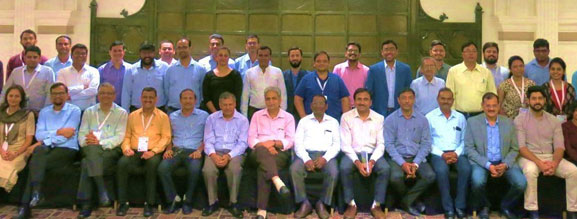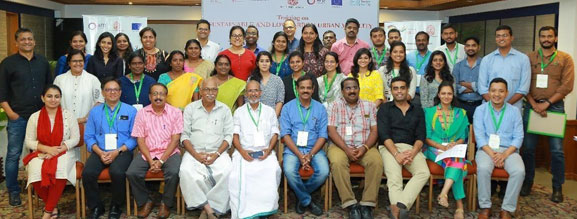Nagpur Smart and Sustainable City Development Corporation
Limited (NSSCDCL) and Nagpur Municipal Corporation (NMC)
hold workshop on
“Sustainable and Low Carbon Urban Transport” in India July, 2019

(The first section of the newly constructed Nagpur Metro, image courtesy: Dr Ajay Kumar)
In 2018, under the umbrella of Mobilise Your City program with support of Ministry of Housing and Urban Affairs (MoHUA), Govt of India three Indian cities - Ahmedabad, Kochi and Nagpur were selected as the MYC partner cities. Under the Program, cities were provided with technical assistance and capacity building support to plan sustainable, ecofriendly interventions & reduce GHG emissions in urban transport. The Program is being implemented with support of European Union (EU), Agence française de
développement (AFD) and the Urban Mass Transit Company Pvt Ltd. (Program Implementation Unit MYC India).
Under the Program, the first capacity building workshop was organized by Nagpur Smart and Sustainable City Development Corporation Limited (NSSCDCL) with participants from Nagpur Municipal Corporation, Maha Metro Rail Corporation Pvt Ltd, Public Works Department Nagpur, Road Transport Office, Traffic Police, CSIR- NEERI and VNIT, etc.
This two-day training workshop focused on ‘Sustainable and Low Carbon Urban Transport’ during July 22- 23, 2019 and was organized for city officials. The workshop objective was to encourage participants to:
- reflect on approaches to improve accessibility by introducing more efficient, inclusive, safe and innovative public transport,
- understand the need for shift from private motor vehicles to more efficient and environmentally friendly modes of walking, cycling and public transport,
- evaluate a range of planning tools focused on land use planning, transit oriented development, needs differentiated by gender, age, people with disabilities,
- share effects of urban transport related GHG emissions on air quality and climate change in cities and role of sustainable transport in reducing the carbon footprint of a city.

(Image courtesy: UMTC)
The workshop shared the on-going urban mobility initiatives in the city and information dissemination amongst key stakeholders on sustainable transportation planning, mobility modes and new paradigms like shared and electric mobility.
The workshop was delivered with support of international and national experts like Dr. Ajay Kumar (consultant, World Bank), Mahesh Gupta (JGM, Maha Metro), S. Ramakrishna, Dr. Abhijit Lokre, N.Seshadri, Sonal Shah, Dr. Ankit, Dr Udit etc. focused on significance and provisions under National Urban Transportation Policy – 2006, comprehensive mobility planning, importance of non- motorized transport, gender based mobility needs of a city and myths in urban transport; while also showcasing the best practices of sustainable transport around the globe.
The workshop with the help of comprehensive mobility plan prepared for Nagpur, highlighted the change in travel patterns and mode choice of people such as reduced walking and cycling trips versus increase in usage of 2W. Case examples of Pune and other cities with key elements like wider footpath, proper street lighting, seating spaces, shade, vendor zones, etc – elements that make street walkable, safe and lively – were deliberated.
Key feedback from the participants:
- “The workshop helped us understand that transport sector contributes to almost 25-30% of CO2 emissions with a major share of passenger transport.
- “Initiatives like planning for non- motorized and last mile connectivity can act as tools for sustainable urban transportation systems”.
- “We built MRTS in Indian cities as a solution for congestion and are now working on a network of feeder systems plus last mile connectivity, as they play an equally crucial role in improving mobility in the city”
- “The present approach towards urban transport system planning does not incorporate gender sensitive data. The session on integrating gender in transport, shared different mobility pattern of women for instance women tend to combine multiple trips called trip chaining or tend to have shorter trip lengths as compared to men. With increasing women travelers, there is a definitive need to collect and analyze gender segregated data so that appropriate solutions can be provided”.
Similar workshops were also carried out in Kochi and Ahmedabad - the two other MYC cities in India on 25 – 26 July and 15 – 16 October, 2019, respectively. Participants from various urban local bodies such as Ahmedabad Municipal Corporation, Ahmedabad Janmarg Limited, Ahmedabad Urban Development Authority, Ahmedabad Traffic Police, Gujarat Metro Rail Corporation, National Highways Authority of India, Kochi Municipal Corporation, Kochi Metro Rail Corporation, Cochin Smart Mission Limited, Kerala State Road Transport Corporation, Kerala Motor Vehicle Department, etc. attended in the two cities. In total 45 different organizations participated with around 200 participants over these 6 days of engagement.

(Workshop in Kochi, Image courtesy: UMTC)

(Workshop in Ahmedabad, Image courtesy: UMTC)